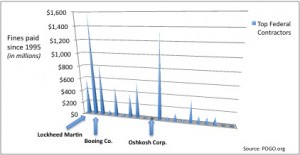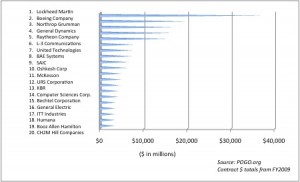WASHINGTON–Of the top 20 companies doing work for the federal government, only one has a clean record.
It’s a truck manufacturer from Wisconsin, a company that shares the name with the city it’s based in, Oshkosh.
Oshkosh Corp. is relatively new to the federal contractor heavy hitter list. In 2001, the truck manufacturer was awarded fewer than 300 government contracts. By 2005, that number had increased tenfold. Last year, Oshkosh Corp. signed more than 4,600 contracts with the government.
The truck-making company got so popular so fast because it won bids to make mine-resistant, ambush-protected – or MRAP — vehicles for the military. The armored vehicles have been heavily utilized in the wars in Iraq and Afghanistan. What makes MRAP vehicles effective are their V-shaped bottoms, which deflect traditional roadside bombs.
 When the MRAP pushed Oshkosh into the Top 20 federal contractors, the company joined Lockheed Martin – the top contractor with more than 20,000 contracts in 2010 and Boeing Co., with more than 13,000 contracts in 2010 – among others.
When the MRAP pushed Oshkosh into the Top 20 federal contractors, the company joined Lockheed Martin – the top contractor with more than 20,000 contracts in 2010 and Boeing Co., with more than 13,000 contracts in 2010 – among others.
All but Oshkosh have been fined by the government for misconduct.
Lockheed has paid more than half a billion dollars in fines since 1995. But that amount is only a fraction of the more than $30 billion per year Lockheed makes in government contracts. Boeing has paid more than $1.5 billion in federal fines since 1995; last year, its federal contracts were worth more than $19 billion.
When talking about fines, it’s important to consider the amount of money invested in government contracts.
“Lockheed Martin has many instances [of misconduct], but many of them occurred 10 or more years ago,” said Neil Gordon of the Project on Government Oversight, a government watchdog group. “Their misconduct penalty total is also pretty small considering all the instances they have.”
That doesn’t excuse the misconduct, Gordon added: “Corporate misconduct should not be accepted as just a cost of doing business.”
Its unusually fast ascent up the federal contractor ladder means that Oshkosh Corp. hasn’t had to face the scrutiny other contractors expect. Now that the Wisconsin company is on the contractor radar, misconduct fines may be on the horizon, Gordon said.
“Who knows—maybe this increased visibility and rapid growth will lead to more misconduct or the discovery of past instances of misconduct,” he said.
Two reasons explain why the Oshkosh-based company has avoided misconduct fines, according to federal contractor analyst Gary Therkildsen of another government watchdog, OMB Watch.
“Oshkosh could be a reputable company that has strong internal controls for waste, fraud, abuse and corruption. It could be the officials are telling the truth,” Therkildsen said.
But he also suggested that there may be small violations that aren’t easy to spot.
“If a contractor settles a lawsuit either from the government or one that the government joins from a whistleblower, they are relieved of all guilt,” Therkildsen said.
Lockheed Martin said it keeps an internal eye on contract corruption by encouraging employees to speak out against corruption. They’ve been fined for not allowing such an environment in the past.
Retaliation against whistleblowers, kickbacks, age discrimination, fraud, bid-rigging and nuclear safety violations are a few of the dozens of contract violations Lockheed Martin has had to pay for in the last 15 years.
In 2010, a Lockheed Martin employee sued the company for whistle-blowing retaliation. That former employee, who sounded an alarm on company misconduct, won her case in court. The company insists it has moved on.
“Regardless of which mechanism employees use to report their concern about a violation of the law, they may do so without fear of retaliation,” said Lockheed spokesman Jeffery Adams. “Our Corporate culture demands that we keep channels open and encourage our employees to report grievances or suspicions of misconduct.”
Oshkosh Corp. attributes its clean misconduct record to internal transparency.
“We have been fortunate to have employees who embrace and consistently practice our long-standing core values of honesty, integrity, accountability, respect and citizenship,” Oshkosh Corp. Vice President of Ethics Robin Schroeder said. “We encourage employees to speak out, enabling the company to identify and remedy potential misconduct before it becomes critical.”
While Oshkosh is alone among the top 20 in a clean record on fines, there are nine other companies among the top 50 doing business with the government that have not had to pay for misconduct, including Triwest HealthCare Alliance and AM General, which produces Hummers.
But beyond facing steep fines, misconduct is unlikely to jeopardize contracts for those making essential defense products.
“No matter what they do, Uncle Sam still needs to come to them for weapons,” Therkildsen said.
